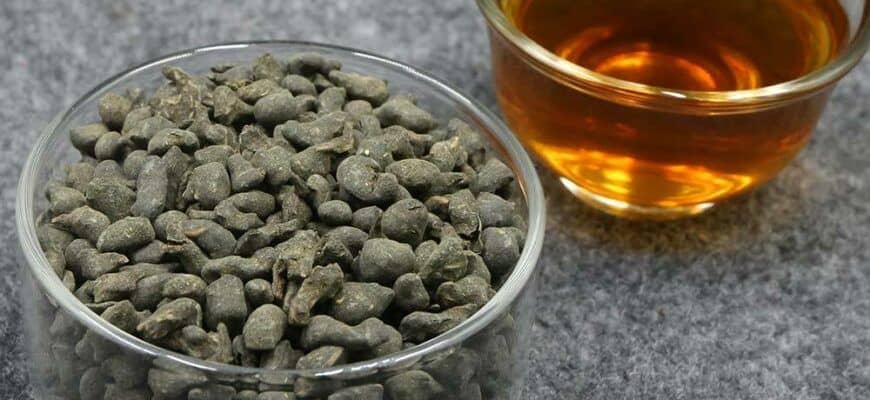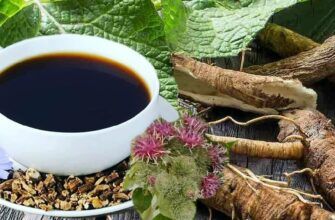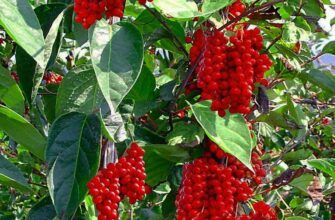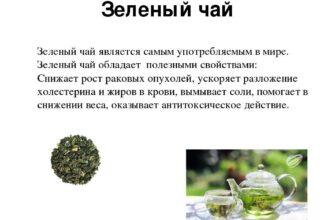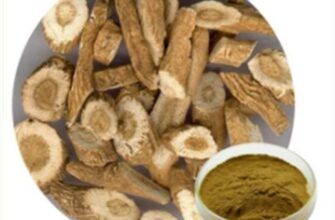Ginseng tea has many benefits that are important for diabetes health, heart health, brain health, etc. It also contains a huge amount of antioxidants. In this article you will find a detailed description of the positive properties of ginseng tea, its side effects, preparation methods, calorie content and something from the history of this wonderful plant.
This tea is obtained from the ginseng plant. It is one of eleven slow growing perennials, has fleshy roots and belongs to the genus Panax of the Araliaceae family.
This plant is mainly found in East Asia and North America and other cool climate regions.
The most famous southern variety of ginseng is Panax Vietamensis. Plants from the genus Panax are strong adaptogens. Two important chemical elements are present in ginseng: gintonin and ginsenosides.
Siberian ginseng (Eleutherococcus) belongs to the same family, but it is not a true ginseng, however it is also a strong adaptogenic. The active components of Eleutherococcus are eleutherosides. It has a tree-like rather than fleshy root.
- Description
- origin of name
- Ginseng classification
- Story
- How to make ginseng tea
- Benefits of ginseng tea
- Nutritional value of ginseng tea
- Health benefits of ginseng tea
- Key Health Benefits of Ginseng Tea
- Treatment of type II diabetes
- Antioxidant Properties
- Cardiovascular health
- Ginseng tea for hair growth
- Ginseng tea for weight loss
- Maintaining Sexual Health
- Ginseng tea for skin
- brain health
- Relieve stress
- Increasing energy levels
- Side effects of ginseng tea
- Estrogen-like effect
- Blood clotting
- hypoglycemia
- Problems of the gastrointestinal tract, neuroses and insomnia
- manic disorders
- Increased blood pressure and heart rate
- Conclusion
Description
Ginseng is commonly grown in damp and shaded mountain areas in Korea, Russia and China. This is a perennial herbaceous plant, up to two or more meters high, outwardly it is very beautiful: red clusters and green leaves. The root of the plant is considered special because of its medicinal properties. It is quite long and resembles the shape of the human body.
Some Asian legends claim that this root has magical powers and only a rare lucky person can find it. The more the root resembles the human body, the more precious it is considered.
Ginseng is one of the most expensive herbs in history and has been in high demand in China and the Far East for centuries. Many wars have been fought in Asia in the regions where it grows, so in many regions it has practically disappeared.
About 80,000 tons of ginseng are sold per year, the main producing countries are China, Canada, South Korea and the USA. Ginseng products have been sold in 35 countries. Half of the sales revenue comes from South Korea. Korea is the largest producer of ginseng and China is the largest consumer.
There are a number of herbs sold under the name ginseng, which can be somewhat misleading to the consumer. Chinese herbalists believe that the Siberian and American variants of the plant are different from Korean ginseng, but they also have a healing effect on the human body. There are eight varieties of ginseng in China, including purple ginseng, black ginseng, and prince ginseng. Consumers should be careful when purchasing and beware of false ginseng products.
origin of name
The Russian word "ginseng" comes from the Chinese word "renshen". "Jeng" means "man" and "Shen" means "plant root". The root is so nicknamed for its obvious resemblance to human legs. The English pronunciation comes from the Southern Chinese words "yun sum" and "jin-sim".
The genus name Panax comes from the Greek and means "healing everything". The name arose because of one of the medicinal properties of ginseng - a mild muscle relaxant.
Other names for ginseng are renxian and guigai.
Ginseng classification
There is the following classification of ginseng:
red ginseng
Red ginseng is a modified form of ginseng. First, it is cleaned, then it is doused with boiling water, and then dried in the sun. Finally, an herbal infusion is made from it.
white ginseng
White ginseng grows in America. This is fresh ginseng that has been dried without exposure to heat. It is dried to reduce the amount of water in it. White ginseng that has been dried in the sun contains fewer medicinal ingredients.
fresh ginseng
Fresh ginseng is a raw product that is available in limited areas.
wild ginseng
Wild ginseng is collected directly in the zone of its growth. Due to the extremely high demand for this species, it is classified as endangered and is quite rare. For this reason, farmers are trying to switch to faster ways of growing it. Wild ginseng can be processed to produce red ginseng.
Story
Let's take a quick look at the history of this amazing plant. Ginseng was used in herbal medicine in ancient China. There are many written records of its healing properties, which date back to 100 AD. e. Traditional Chinese medical literature gives us a very good idea of this herb. Scientific studies have been carried out mainly to confirm its traditional use.
Ginseng was first used by the Chinese around 500 BC. e. and 200 AD e. The well-known Chinese herbalist Shen Nong Bin Cao Jing wrote the following about ginseng: “Ginseng is sweet and slightly cold. It is an addition to the five major organs of the body. It calms the spirit and body, opens the heart and sharpens the mind. It can fill the body with light and give a long life."
Ginseng is also used in the West. There, ginseng was originally used only to treat seriously ill people. Emperors and members of imperial families took wild Manchurian ginseng. Over time, ginseng roots were cultivated and later replaced with condonopsis roots.
Researchers thought ginseng roots cultivated for commercial purposes were useless. But, having examined this plant in more detail, they changed their mind.
How to make ginseng tea
You need to buy a hard rhizome without soft spots. You can also buy thinly sliced rhizomes. Ginseng tea is sweet but has a bitter aftertaste. It can be mixed with chrysanthemum flowers and sweetened with honey.
Three ways to prepare ginseng tea:
- Pour boiling water over 4-5 pieces of ginseng. Leave for five minutes. If you want a stronger tea, increase the steeping time.
- Boil three cups of water and add 8-10 slices of ginseng to it. Boil water for 15 - 20 minutes. Then strain and let the tea cool. It can be served cold. You can also store tea in the refrigerator.
- You can also try the Korean version of ginseng tea. Place thinly sliced ginseng rhizome pieces in a glass bowl and add a few teaspoons of honey. Let it steep for 30 minutes and then add a cup of boiling water.
Benefits of ginseng tea
Ginsenosides
Ginsenosides are a specific group of saponins with a wide range of uses. One of the main properties of these substances is their ability to penetrate into cells.
Panaxosides
Plants of the genus Panax contain about 182 different panaxosides. There are about 50 of them in the ginseng root. Panaxosides belongs to the natural products of steroid glycosides. There are scientific claims that these substances have a beneficial effect on the central nervous system and the cardiovascular system. Some studies also show that panaxosides have antioxidant properties.
Nutritional value of ginseng tea
Good quality ginseng contains many chemical compounds and complex carbohydrates. But not all of them are laboratory tested.
Ginseng tea contains substances that affect our body like sugar, so tea adds energy. It also acts like insulin and stimulates the nervous system.
Panavilon, present in ginseng, affects our endocrine system, and its essential oils stimulate the activity of certain brain centers.
Natural steroids contained in ginseng have an effect similar to sex hormones.
Health benefits of ginseng tea
Ginseng tea has a number of health benefits that include a reduced risk of cancer, a reduced chance of obesity, treatment of digestive problems, menstrual cramps by strengthening the immune system, and relieving signs of nervous and sexual tension.
It also reduces physical and mental stress and allows a person to achieve a sense of relaxation. Researchers at the University of Toronto in Canada have proven that ginseng tea is highly beneficial in the treatment of diabetes. The beneficial properties of ginseng tea are largely determined by the content of “ginsenosides” compounds in it.
Key Health Benefits of Ginseng Tea
Treatment of type II diabetes
Ginseng root tea acts as a nutritional stimulant and can be used in the treatment of type II diabetes. The benefits of ginseng in the treatment of diabetes are clear, and it can be a real lifesaver for people suffering from this disease. Research also supports the benefits of ginseng tea in treating diabetes.
These properties of ginseng were discovered in the study of people who are in a state of a sharp jump in blood sugar (after eating). The study found that type II diabetic patients who took ginseng extract had lower blood sugar levels compared to the placebo group.
Another study used lab rats rather than humans. The study found that ginseng extracts were quite helpful in lowering blood sugar levels. In summary, I would like to advise patients with diabetes to introduce ginseng tea into their diet.
Antioxidant Properties
Ginseng tea is extremely popular because it is a source of powerful antioxidants.
Many studies have shown that it reduces the risk of skin, breast, colon, and esophageal cancers. Ginseng tea may help reduce the risk of lung, stomach, and liver cancer due to its anticancer properties.
An article published in September 2011 in the journal Food and Chemical Toxicology states that ginseng is effective in fighting cancer due to the antioxidant glutathione.
Cardiovascular health
Green tea and ginseng tea promote cardiovascular health.
Research from the Harvard Health Center confirms that regular consumption of ginseng tea prevents the oxidation of low-density lipoprotein, or bad cholesterol, and increases high-density lipoprotein levels, which helps reduce hypertension.
You can add ginseng to green tea and reduce LDL levels. But the reputation of ginseng tea is slightly spoiled by the fact that it can unpredictably affect blood pressure: it can either increase or decrease it.
Ginseng tea for hair growth
A study conducted in Japan in Osaka showed that Ro carbohydrate ginsenoside helps in the fight against androgenetic alopecia, which is more common in men. The researchers state that ginseng can be used as an alternative for most hair loss medications currently on the market.
Ginseng tea for weight loss
Ginseng is very beneficial for maintaining weight. It makes a person energetic and helps fight fatigue.
The most important thing that contributes to weight loss is the regulation of blood sugar levels, and ginseng perfectly copes with this.
Tea reduces the amount of carbohydrates that are converted to fat. But you must remember that if in general you lead a completely unhealthy lifestyle, you should not count on ginseng tea alone.
A person should follow a healthy diet at the same time as drinking ginseng tea. But in no case should the diet be taken to extremes: anorexia and bulimia can develop, and these are serious mental and physiological diseases.
Maintaining Sexual Health
Ginseng tea is beneficial for sexual dysfunction in men.
A Korean study demonstrated the benefits of ginseng tea for erectile dysfunction, and the results showed that 60% people who took ginseng tea achieved an erection with ease. However, about 30% of men experienced an improvement in erection in the placebo group as well.
Approximately two-thirds of the men in the study reported that they experienced an improvement in their erection and healthy sexual arousal levels after drinking the tea.
This effect is achieved through the production of nitric oxide in the body.
Another study done on diabetic rats found that diabetic rats had low levels of antioxidants and were more at risk of developing erectile dysfunction. Ginseng was introduced into the diet of rats and the indicators improved significantly. Antioxidant levels increased dramatically, and the rats achieved erections faster. Some studies have also shown that sex drive in rats also increases with ginseng tea.
A recent double-blind study on the effects of Korean ginseng on sexual function included 45 men with moderate to severe erectile dysfunction. A threefold improvement in performance has been reported with a daily dose of 900mg of Korean ginseng.
Ginseng tea for skin
Ginseng tea boosts skin cell regeneration by increasing skin cell oxygenation. Tea also improves blood circulation and cleanses the blood, which has a beneficial effect on skin health. Thanks to ginseng, toxins and toxins are removed from the body, which returns the skin to a natural healthy color.
brain health
Ginseng tea is an herbal drink that helps maintain normal brain function. It improves cognitive abilities and the ability to increase concentration levels. Its use is highly recommended for students to improve the functioning of brain cells.
Ginseng tea facilitates brain speech processes, along with other health benefits.
Relieve stress
Ginseng is a strong adaptogen. Herbs that belong to this species increase resistance to mental and environmental stress. They work by reducing the stress hormone cortisol, which depresses the adrenal glands. Adaptogens support adrenal function and calm the person. Ginseng tea can also prevent stress-induced stomach ulcers.
Increasing energy levels
Ginseng tea also increases a person's energy levels. It has long been used to increase strength and endurance. Tea is very useful for increasing physical performance and for those who struggle with fatigue as a result of certain health conditions. Ginseng tea has also been shown to reduce fatigue and increase energy in cancer patients.
Side effects of ginseng tea
Ginseng tea has a number of benefits, but it can also cause some of the side effects described below:
Estrogen-like effect
Ginseng sometimes produces an estrogen-like effect in the body. According to some reports, postmenopausal women may experience menstrual irregularities, breast tenderness, and menstrual bleeding after consuming ginseng. Therefore, women are not recommended to take ginseng extracts during pregnancy and lactation.
Blood clotting
Ginseng tea can thicken the blood and, as a result, lead to the formation of blood clots. A double-blind clinical trial conducted at the University of Pittsburgh Medical Center found that ginseng extract may reduce the effectiveness of Coumadin (a blood thinner). Ginseng tea should be avoided if you are taking blood thinners to reduce the risk of blood clots.
hypoglycemia
Consuming this herbal tea can lower blood sugar levels and cause hypoglycemia in some people. In a person with diabetes, the risk of developing hypoglycemia is significantly increased. Sometimes the combination of treating diabetes and drinking ginseng tea can cause an excessive drop in blood sugar levels.
Problems of the gastrointestinal tract, neuroses and insomnia
Consumption of ginseng tea can lead to gastrointestinal problems. Some people talk about the occurrence of nervousness and insomnia after taking ginseng tea. If you are taking caffeine with glucose, the risk of these side effects may be increased. Some people experience vomiting, diarrhea, and nausea as side effects.
manic disorders
Long-term use of certain types of ginseng, such as Korean ginseng, may increase a person's risk of a manic disorder. A case has been reported in which a 26-year-old man with no history of mental illness became manic-depressed after long-term use of Korean ginseng. He consumed about 250 mg of Korean ginseng three times a day.
Increased blood pressure and heart rate
Some types of ginseng, such as Korean ginseng, can increase a person's heart rate and increase blood pressure. Many report an increase in heart rate and blood pressure after taking ginseng tea. So, if you have high blood pressure, which is difficult to control medically, it is recommended to consult a doctor before using ginseng.
Conclusion
While ginseng tea has many benefits, it also has some side effects and can cause serious health problems if consumed in large amounts for a long time. Therefore, you must remember that ginseng tea, like any other natural product, should be consumed in moderation and with the consent of your doctor. Not to be taken by pregnant and lactating mothers.
Read more: